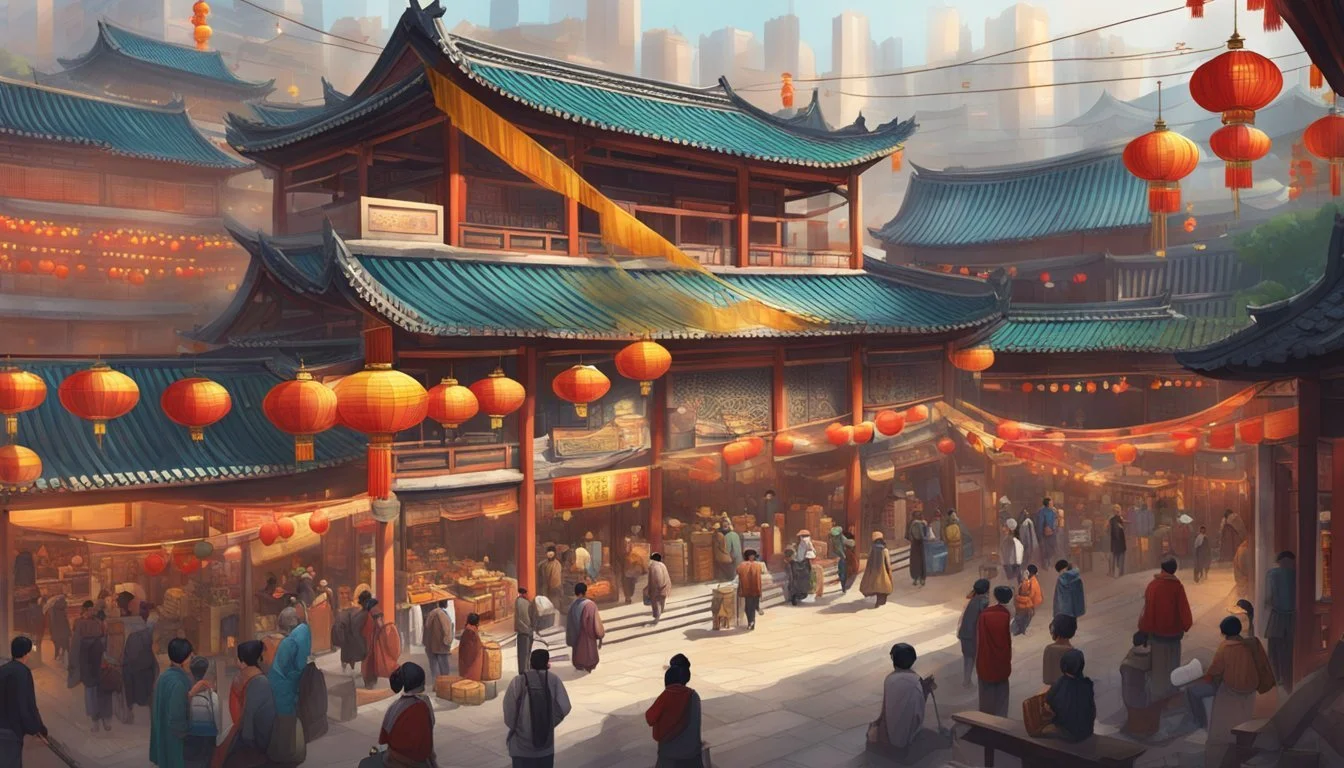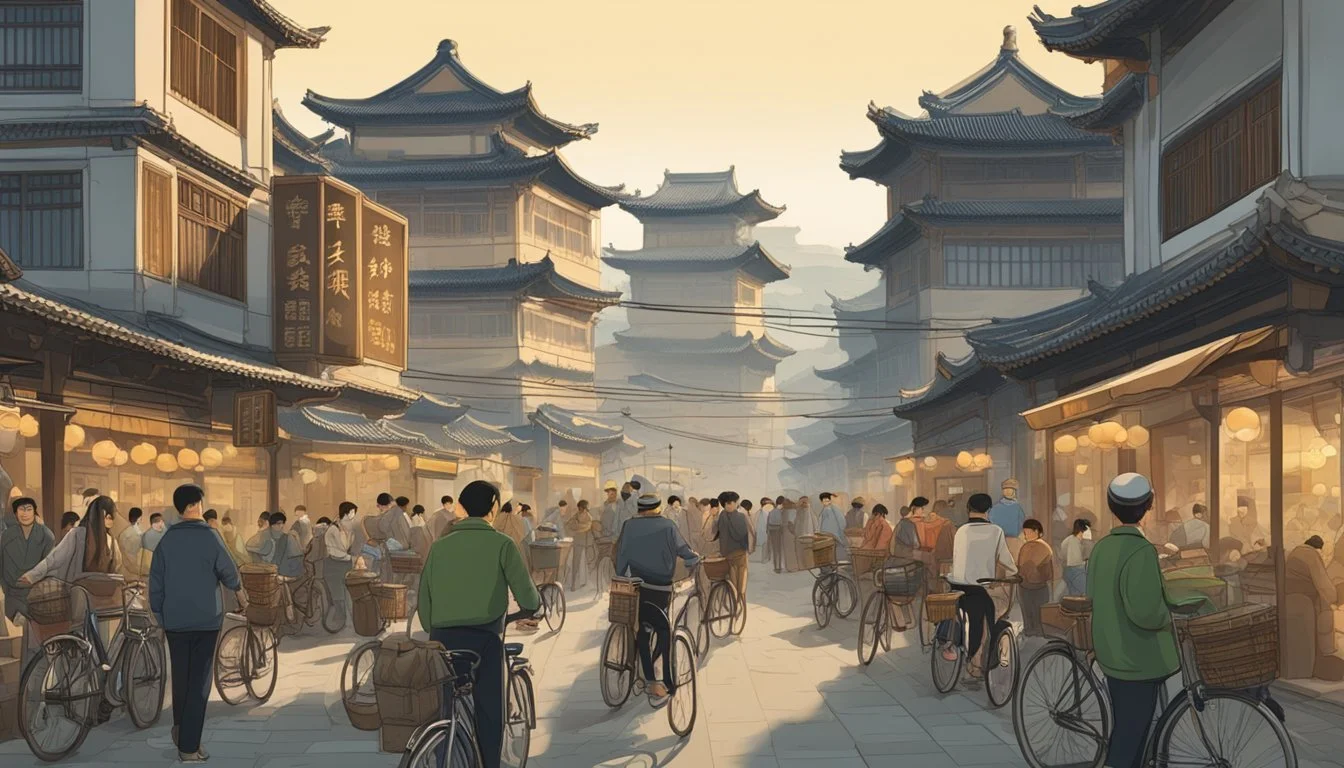9 Documentaries Examining the Cultural Revolution in China
Uncovering a Turbulent Era
The Cultural Revolution in China, which lasted from 1966 to 1976, was a tumultuous period that profoundly impacted Chinese society. Documentaries examining this era provide valuable insights into the events, experiences, and consequences of this decade-long upheaval.
These films offer viewers a window into the complex social and political dynamics that shaped China during the Cultural Revolution. Through interviews, archival footage, and expert analysis, documentaries help illuminate the personal stories and broader historical context of this transformative period in Chinese history.
1) The Gate of Heavenly Peace
The Gate of Heavenly Peace is a compelling documentary that examines the 1989 protests in Tiananmen Square, Beijing. Directed by Carma Hinton and Richard Gordon, this three-hour film provides an in-depth look at the events that unfolded during those tumultuous weeks.
The documentary features interviews with participants, leaders, and scholars, offering diverse perspectives on the protests. It combines these firsthand accounts with archival footage to create a comprehensive narrative of the events.
The film explores the cultural and historical context that led to the demonstrations. It delves into the complex social and political factors that influenced the protesters and the government's response.
The Gate of Heavenly Peace captures the drama, tension, and tragedy of the six weeks from April to June 1989. It presents the unfolding events with a focus on factual representation, allowing viewers to form their own interpretations.
This documentary serves as a valuable resource for understanding a pivotal moment in Chinese history. It has been broadcast on various platforms, including PBS and BBC, reaching audiences worldwide.
2) Morning Sun
"Morning Sun" is a 2003 documentary film directed by Carma Hinton that explores the Cultural Revolution in China. The film offers a comprehensive look at this tumultuous period in Chinese history, which lasted from approximately 1964 to 1976.
The documentary uses a combination of archival footage, propaganda materials, and interviews with former Red Guard participants and victims. This multi-faceted approach provides viewers with a nuanced understanding of the events and their impact on Chinese society.
Hinton, an American filmmaker who grew up in China, brings a unique perspective to the subject. Her background allows for a deeper insight into the complexities of the Cultural Revolution and its effects on individuals.
"Morning Sun" examines the various phases of the Cultural Revolution, from its inception to the purging of the Gang of Four in 1976. The film also touches on earlier events, such as the Long March, to provide context for the revolution's origins.
Through its interviews and historical footage, the documentary sheds light on the shifting political currents and unpredictable nature of the Cultural Revolution. It offers viewers a glimpse into the experiences of those who lived through this transformative period in Chinese history.
3) China: A Century of Revolution - Part 2
The second installment of "China: A Century of Revolution" focuses on the Mao Zedong era from 1949 to 1976. This documentary provides an in-depth look at China under Communist rule during this pivotal period.
The film explores major events and campaigns that shaped modern China. It covers the establishment of the People's Republic of China in 1949 and the subsequent social and economic transformations.
Rare archival footage and eyewitness accounts offer viewers a candid glimpse into life during Mao's leadership. The documentary examines the Great Leap Forward and its devastating consequences on the Chinese population.
It also delves into the Cultural Revolution, a decade-long period of social and political upheaval. The film presents various perspectives on this tumultuous time, showcasing its impact on ordinary citizens.
Through historical commentary and personal stories, the documentary paints a complex picture of China's development. It highlights the challenges faced by the nation as it underwent rapid changes under Mao's vision.
4) The Mao Years
"The Mao Years" is a documentary that explores China's history from 1949 to 1976 under Mao Zedong's leadership. It forms part of the "China: A Century of Revolution" series, offering a comprehensive look at this pivotal era.
The film begins with the establishment of the People's Republic of China in 1949, a moment of great optimism for many Chinese citizens. It then chronicles the subsequent decades of Mao's rule, examining the major political and social events that shaped the nation.
Using rare archival footage and eyewitness accounts, the documentary provides an intimate portrayal of life during this tumultuous period. It covers key events such as the Great Leap Forward and the Cultural Revolution, offering insights into their impacts on ordinary Chinese people.
The documentary presents a balanced view of Mao's era, acknowledging both the aspirations for progress and the challenges faced by the population. It serves as a valuable resource for understanding the complexities of modern Chinese history.
Through its candid approach, "The Mao Years" sheds light on a once-secretive nation, contributing to a deeper understanding of China's 20th-century transformation.
5) Chronicle of a Cultural Revolution
"Chronicle of a Cultural Revolution" is a compelling documentary that examines the tumultuous period in China's history from 1966 to 1976. The film uses archival footage and interviews to provide a comprehensive look at the events and impacts of this decade-long upheaval.
Directed by a team of Chinese and international filmmakers, the documentary presents a balanced perspective on the Cultural Revolution. It explores the initial idealism and revolutionary fervor that swept through the country, as well as the subsequent chaos and violence that ensued.
The film features interviews with participants from various backgrounds, including former Red Guards, intellectuals, and ordinary citizens. These firsthand accounts offer personal insights into the experiences of those who lived through this transformative era.
Archival footage, much of it previously unseen, brings the events of the Cultural Revolution to life. The documentary showcases mass rallies, political campaigns, and the destruction of cultural artifacts, providing viewers with a visual understanding of the period's intensity.
"Chronicle of a Cultural Revolution" also examines the long-term consequences of this historical event on Chinese society, politics, and culture. It offers a nuanced view of the complexities and contradictions that defined this pivotal moment in China's modern history.
6) Wu Wenguang's Bumming in Beijing
Wu Wenguang's documentary "Bumming in Beijing: The Last Dreamers" offers a unique perspective on life in China's capital in the late 1980s. Released in 1990, the film follows five young artists struggling to make their mark in Beijing.
The documentary provides an intimate portrayal of these individuals as they navigate the challenges of urban life. Wu's cinéma vérité approach captures raw, unscripted moments, giving viewers a genuine glimpse into the artists' daily experiences.
"Bumming in Beijing" marked a significant shift in Chinese documentary filmmaking. It moved away from state-sponsored propaganda, embracing a more independent and personal style of storytelling.
Wu Wenguang's work is considered groundbreaking in the realm of Chinese independent cinema. The film's release in 1990 established Wu as a pioneering figure in the country's documentary movement.
While not directly addressing the Cultural Revolution, "Bumming in Beijing" depicts its aftermath. The artists' struggles reflect the changing social and cultural landscape of China in the years following this tumultuous period.
7) Though I Am Gone
"Though I Am Gone" is a powerful documentary directed by Hu Jie that sheds light on a tragic event during China's Cultural Revolution. The film focuses on Bian Zhongyun, the vice principal of a prestigious girls' school in Beijing.
On August 5, 1966, Bian was beaten to death by her own students, becoming one of the first victims of the revolutionary violence that swept through China. The documentary explores this shocking incident through interviews and archival materials.
A unique aspect of the film is its use of photographs taken by Bian's husband, Wang Jingyao. In the aftermath of his wife's death, Wang documented the scene, providing visual evidence of the brutality that occurred.
Hu Jie's documentary serves as a stark reminder of the human cost of political upheaval. It examines the complexities of the Cultural Revolution and its impact on individuals and families.
"Though I Am Gone" offers a poignant look at a dark chapter in Chinese history. By focusing on one woman's story, the film illuminates broader themes of violence, ideology, and the consequences of mass mobilization.
8) Up to the Mountain, Down to the Village
"Up to the Mountain, Down to the Village" was a significant movement during China's Cultural Revolution. It involved sending urban youth to rural areas for reeducation and manual labor.
The movement began in the late 1960s and continued into the 1970s. Millions of young people, mostly high school graduates, were relocated from cities to remote countryside regions.
Chairman Mao Zedong initiated this program to reduce urban unemployment and expose privileged youth to rural life. The government hoped to instill revolutionary values and eliminate bourgeois thinking among the younger generation.
Participants faced harsh living conditions and demanding physical work in agriculture. Many struggled to adapt to rural life, experiencing isolation and hardship.
The program had lasting impacts on Chinese society. It disrupted the education and careers of an entire generation, often referred to as the "lost generation."
Some documentaries exploring this movement feature interviews with former participants. They share personal stories of their experiences and the long-term effects on their lives.
These films provide valuable insights into a unique period of China's history. They shed light on the human cost of ideological campaigns and forced relocation policies.
9) Red Father
"Red Father" is a documentary that explores the complex relationship between a daughter and her father against the backdrop of China's Cultural Revolution. The film follows Yilin Wang as she delves into her father's past as a dedicated Communist Party member.
Through interviews and archival footage, the documentary paints a nuanced picture of life during this tumultuous period in Chinese history. It examines the ideological fervor that swept through the country and its impact on families.
The film offers a personal perspective on the Cultural Revolution's lasting effects. It showcases how political beliefs can shape family dynamics and individual identities across generations.
"Red Father" provides valuable insights into the human cost of political upheaval. It raises questions about loyalty, ideology, and the consequences of unwavering belief in a cause.
By focusing on one family's story, the documentary makes the broader historical events more relatable and accessible to viewers. It serves as a thoughtful exploration of a pivotal moment in China's recent past.
Historical Context of the Cultural Revolution
The Cultural Revolution was a decade-long period of social and political turmoil in China from 1966 to 1976. It aimed to purge capitalist elements and preserve communist ideology under Mao Zedong's leadership.
Ideological Foundations
Mao Zedong launched the Cultural Revolution to combat perceived bourgeois influences and reinvigorate communist fervor. He mobilized Chinese youth as Red Guards to attack traditional values and authority figures. The movement promoted Mao's cult of personality and sought to eliminate his political rivals.
Mao's "Little Red Book" of quotations became a key text, spreading his ideology to the masses. The revolution emphasized class struggle and aimed to create a classless society through radical egalitarianism. It rejected expertise and intellectualism in favor of peasant wisdom and revolutionary zeal.
Key Events and Timelines
1966: Mao initiates the Cultural Revolution, issuing the "May 16 Notification" denouncing party leadership.
1966-1968: Red Guards engage in widespread violence and destruction of cultural heritage.
1968: Millions of urban youth are sent to rural areas for "re-education."
1969: Lin Biao is named Mao's successor at the 9th Party Congress.
1971: Lin Biao dies in a plane crash after an alleged coup attempt.
1976: Mao Zedong dies, leading to the arrest of the Gang of Four and the official end of the Cultural Revolution.
The period saw widespread persecution, economic disruption, and an estimated death toll in the millions. Its effects continue to shape Chinese society and politics today.
Impact on Society
The Cultural Revolution profoundly reshaped Chinese society, transforming education, culture, and social structures. Its effects reverberated for decades after the movement officially ended.
Changes in Education and Culture
Schools and universities closed during the early years of the Cultural Revolution. Traditional education was replaced with political indoctrination and manual labor. Students were encouraged to criticize teachers and intellectuals.
The arts became heavily politicized. Revolutionary operas and ballets promoted communist ideals. Classical Chinese literature and artifacts were destroyed as "bourgeois."
Red Guard groups attacked symbols of "old culture." Historic sites, temples, and cultural relics were vandalized or demolished.
Traditional values like filial piety were rejected in favor of loyalty to Mao and the party. Family ties weakened as children denounced parents.
Long-term Social Effects
The Cultural Revolution created deep generational divides in Chinese society. Those who came of age during this period had limited formal education.
Distrust of authority and institutions lingered long after the movement ended. Many became disillusioned with radical politics.
Millions of urban youth were "sent down" to rural areas, disrupting families and career paths. This policy widened the urban-rural divide.
The persecution of intellectuals led to a "brain drain" that impacted China's development for years. Scientific and technological progress stagnated.
Social mobility decreased as family background became a key factor in opportunities. Those with "bad class backgrounds" faced discrimination.
Representation in Documentaries
Documentaries exploring the Cultural Revolution in China employ diverse narrative styles and face unique challenges in portraying this complex historical period. Filmmakers must navigate sensitive political topics while striving for accuracy and authenticity in their representations.
Narrative Styles and Perspectives
Western documentarians often adopt an outsider perspective when examining the Cultural Revolution. They frequently rely on archival footage, interviews with survivors, and expert commentary to construct their narratives. Some films, like Michelangelo Antonioni's "Chung Kuo" (1972), offer rare glimpses into China during this turbulent era.
Chinese filmmakers, on the other hand, may provide insider perspectives. Their works sometimes incorporate personal experiences or family histories, offering intimate portrayals of life during the Cultural Revolution. These documentaries often blend historical analysis with individual stories, creating a more nuanced representation of the period.
Challenges in Documentary Filmmaking
Producing documentaries about the Cultural Revolution presents several obstacles. Access to accurate information and primary sources can be limited due to political sensitivities. Filmmakers must navigate censorship and potential government restrictions, especially when working within China.
Representing diverse viewpoints poses another challenge. Documentarians strive to balance official narratives with personal accounts, seeking to portray the complexity of the era. They must also contend with the passage of time, as memories fade and witnesses become scarcer.
Technical hurdles include the scarcity of high-quality archival footage and the need to recreate historical scenes sensitively. Ethical considerations arise when dealing with traumatic experiences, requiring filmmakers to approach subjects with care and respect.





